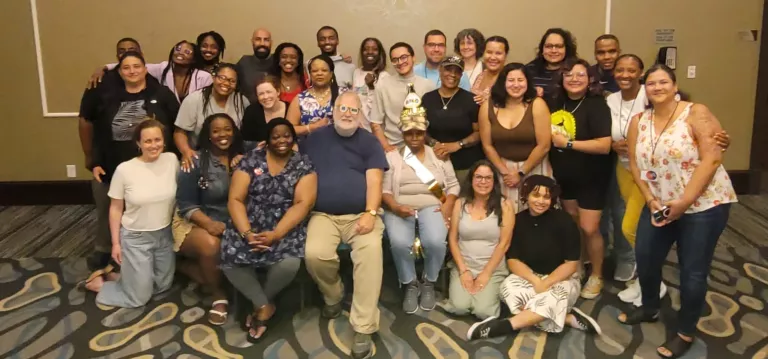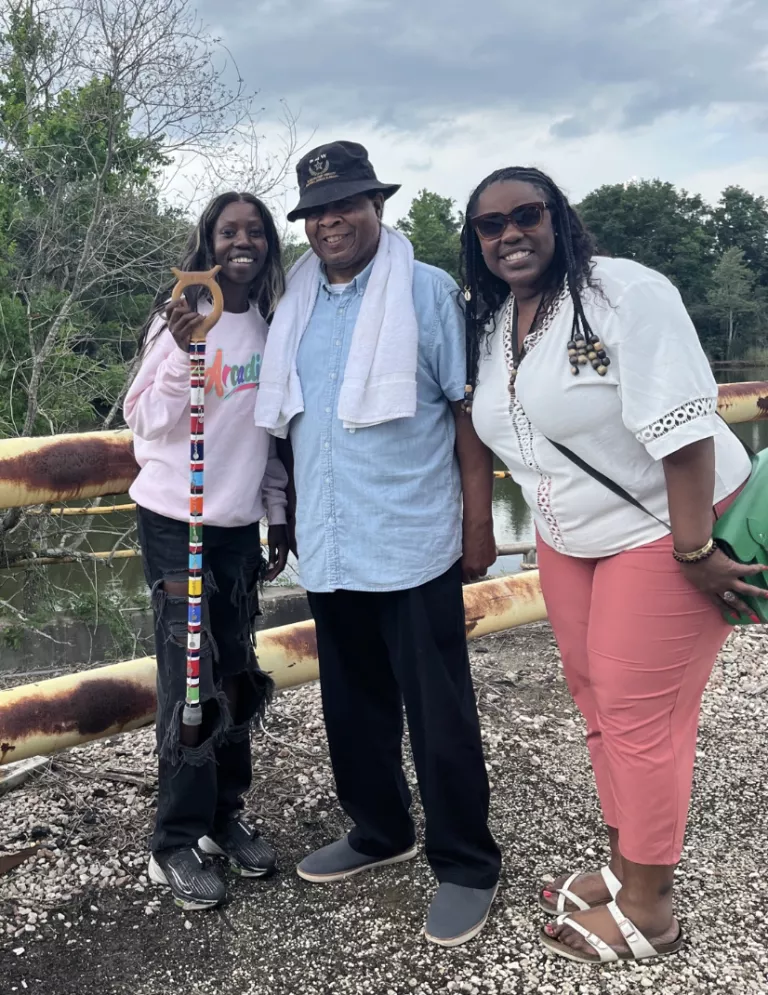by Nyalat Biliew, Grassroots Climate Action Organizer


I had the honor of traveling with a civil rights and anti-racism tour that stopped in New Orleans, Alabama, and Georgia. Due to my hectic schedule, I wasn't initially sure if I could take part, but I'm happy for the chance to work with the Black Action Team and plan an illuminating historical tour. My desire to better our understanding of environmental racism and establish direct contact with impacted communities is in line with the goals of my work. It has been a wonderful experience that is both unexpected and very valued. The Black Action Team has given me a secure place to discover my purpose and develop alongside others who share my experiences. I am incredibly grateful to Miss Joselyn and the crew for all the work they put into this tour. We started Monday with a welcome session before we began the 5 day bus tour! The welcome session allowed me to network and establish connections with other Sierra Club members I hadn't previously interacted with. Knowing my coworkers and how they prioritize this vital work in their everyday lives was important. However, it was disappointing to learn that a number of devoted individuals will be leaving the Sierra Club soon. These people have served as some of my role models and have helped the Sierra Club become successful and well-organized.
In a powerful session, our guest speaker Joan Gardner passionately shared the story of her father's involvement in the Civil Rights movement, shedding light on the immense struggle and injustice they faced. Her words conveyed the deep impact of their fight for equality, emphasizing the significance of their actions. She highlighted historical events, such as the Supreme Court case and the University Board of Education argument, showcasing the pivotal role her father played. Her father, a law student at Southern University Law at the time, participated in a momentous civil rights demonstration in 1960, where he and other activists sat inside various establishments in resistance to racial segregation. Despite being arrested and facing multiple charges, their case ultimately reached the Supreme Court, resulting in a unanimous decision ruling in favor of the students. Joan emphasized that the struggle for equality and justice did not begin in the 1960s but had a long history dating back to the 1700s, marked by notable events such as rebellious uprisings started by enslaved Africans and the fight for racial justice.
She acknowledged the resilience and sacrifices made by countless individuals, including her own family members, in the pursuit of freedom and equality. She spoke of his upbringing in a family of educators, rooted in a legacy of activism. Joan also mentioned the challenges her father encountered, including being forced to relocate to continue his education due to racial discrimination. Joan also discussed her father's later experiences as a police officer, where he bravely spoke out against police brutality and faced unjust treatment himself. She highlighted ongoing efforts to address the legacy of systemic oppression, including recent accomplishments such as securing recognition for her father's contributions and the placement of historical markers. Joan emphasized the need for more than symbolic gestures and ceremonial actions, calling for genuine acknowledgment, reparations, and active support in the ongoing fight for racial justice.
The next day, we embarked on a bus journey to Gulf Port, Mississippi, previously known as Turkey Creek. Despite not being able to join us physically, Derek Evans provided a virtual tour of the area, showcasing the former residences and the community's environment before it was occupied. Derek's remarkable story, which is documented in the film "Come Hell or High Water: The Battle for Turkey Creek," highlighted his relentless fight for environmental justice. During the virtual tour, we witnessed the places Derek cherished from his childhood, as well as the areas where people were displaced and the devastating impact of Hurricane Katrina on their community. His relentless dedication to raising awareness about his community's struggles and the profound organizing efforts he undertook were evident. After the virtual tour, we watched the documentary during our bus ride to Mobile, Alabama. The film follows Derek's journey as a teacher in Boston who returned to Mississippi upon learning that the graveyard where his ancestors lay was being demolished to make way for the new city of Gulf Port. Over the years, Derek and his community stood up against powerful corporate interests and politicians who aimed to transform the area into a toxic waste commercial zone.
Later that day, we visited Africatown, another community established by formerly enslaved African Americans. Joe Womack, a retired army major and local environmental justice leader, gave us a heartfelt tour of the town. He shared historical contexts, including notable African American baseball players who were raised and resided there. Joe and other community members are actively engaged in restoration work and have developed a community garden, which offers free access to fresh produce for all residents. Africatown is situated amidst a paper mill, oil storage tanks, and an industrial railroad, exposing its residents to various poisonous chemicals. Despite these challenges, Joe and other dedicated individuals are actively engaged in restoration work and grant applications to preserve and improve the community. The history of Africatown traces back to Timothy Meaher, a wealthy Alabama businessman who owned the land and brought enslaved Africans to the area before the Louisiana Purchase. After emancipation, many descendants of those enslaved Africans returned to the region and established Africatown as a freed community dedicated to catering to African Americans, providing a safe space for them to live and thrive.
On Thursday, we drove to Atlanta. We had a debrief where we were joined by Tomorrow Bowen, a recent graduate from Emory University and who was also an intern at the Ohio chapter. She shared her research on the classification of superfund sites—hazardous locations resulting from waste dumping—and how biases in research methodologies often overlook the predominantly black and brown communities affected by these sites. Tomorrow also sheds light on Cop City in Atlanta, which is set to become a training facility for local, state, and international police forces, specifically designed to handle protests against the state. The implications of this project are alarming: it involves destroying native land and constructing a facility that will serve as a forefront for oppressive measures against those fighting for their rights, including land access, preservation, and justice. Moreover, the fact that the project is privately funded by organizations like the Atlanta Police Foundation raises concerns. This experience was deeply moving, evoking strong emotions within me. It was extremely difficult to witness individuals who are immensely dedicated to their work, knowing that they will be leaving their positions in just two weeks. Despite this, they spoke with immense pride and love about the work they have been doing, even though they lack the resources, support, and recognition they deserve. It was disheartening to realize that their vital work may not continue within our organization, and the uncertainty of our path forward weighed heavily on us.
In conclusion, these experiences highlighted the struggles faced by marginalized communities in the face of environmental racism. The stories of Turkey Creek and Africatown underscore the historical importance of land preservation, community resilience, and the ongoing fight for recognition and protection. The lack of awareness around the environmental racism experienced by Black community needs to be addressed, as these issues form the core of their oppressive experiences, ultimately resulting in land loss, exposure to toxic chemicals and other environmental injustices. I hope the Sierra Club continues to prioritize historical tours like this, extending beyond the areas we explored. It would be valuable for us to examine how other states have historically marginalized black, brown, and indigenous communities, allowing us to comprehend the profound harm and oppression inflicted by such policies and practices